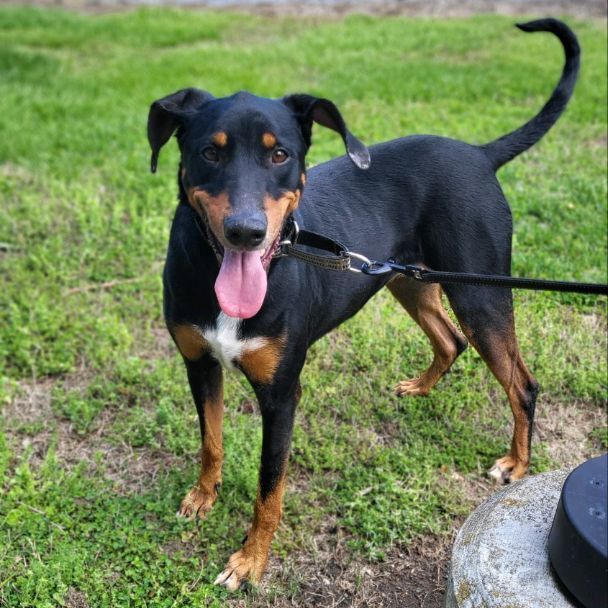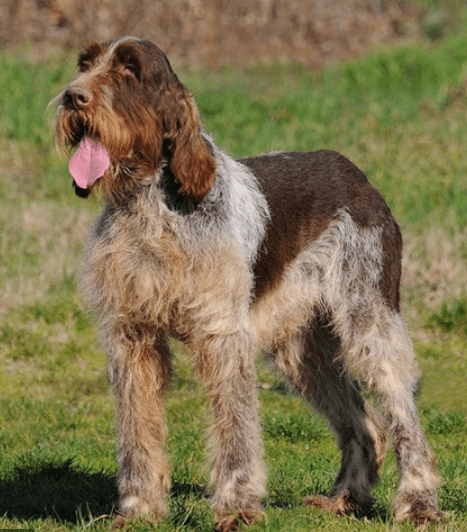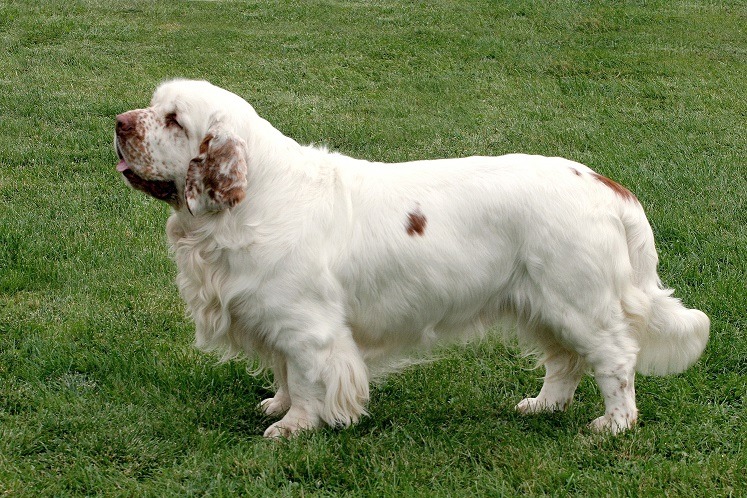The Doberman Lab Mix, often called the Doberdor, is a blend of the Doberman Pinscher and the Labrador Retriever. This hybrid brings together the best traits of both breeds, resulting in a dog that is loyal, smart, and full of energy. If you are thinking about getting a Doberman Lab Mix, it is important to understand their traits, care needs, and the benefits they offer.
Physical Characteristics of the Doberman Lab Mix
Appearance
A Doberman Lab Mix can look different depending on which parent they take after more. They often have a sleek, strong build. They may have the Doberman’s defined body with the Labrador’s friendly look. Their coat can be short to medium in length. Common colors include black, brown, or a mix of both. Some may have the tan markings of a Doberman, while others might look more like a Labrador.
Size and Weight
Doberdors are usually medium to large dogs. They can weigh between 60 to 100 pounds. They stand about 21 to 27 inches tall at the shoulder. Males are often bigger than females. Both genders are known for their strength and athletic build. This size makes them suitable for many activities, from jogging to agility training.
Temperament and Behavior
Intelligence
Doberman Lab Mix dogs are very intelligent. Both the Doberman and the Labrador are known for their sharp minds. This makes Doberdors quick learners. They need mental stimulation to stay happy. Without enough mental activity, they can get bored and become destructive.
Loyalty and Protectiveness
Doberdors are extremely loyal and protective. They inherit the Doberman’s guarding instincts and the Labrador’s friendly nature. This mix makes them great family pets and watchdogs. They are usually good with children. Early socialization and training are key to making sure they grow up well-behaved.
Energy Levels
Doberman Lab Mix dogs have high energy levels. They need regular exercise to stay happy and healthy. Daily walks, playtime, and mental challenges are essential. Without enough physical activity, they can become restless and exhibit unwanted behaviors. An active household is ideal for this breed.
Training and Socialization
Early Training
Training should start early for a Doberman Lab Mix. Their intelligence makes them responsive to training. Consistency and positive reinforcement are key. Basic obedience training should begin as soon as you bring them home. This will help manage their energy and ensure they are well-mannered.
Socialization
Socializing your Doberdor is equally important. Expose them to different people, environments, and other animals from a young age. This helps them become well-rounded dogs. Puppy classes, dog parks, and regular outings can help with socialization.
Health and Lifespan
Common Health Issues
Like all breeds, the Doberman Lab Mix can be prone to certain health issues. Common concerns include hip dysplasia and bloat. Regular vet check-ups and a healthy diet can help manage these risks. It’s also important to know about any genetic conditions present in the parent breeds.
Lifespan
The average lifespan of a Doberman Lab Mix is around 10 to 14 years. Proper care, including regular exercise, a balanced diet, and routine vet visits, can contribute to a longer life. Keeping an eye on their weight and ensuring they get enough physical and mental stimulation is crucial for their well-being.
Grooming and Care
Coat Maintenance
Grooming needs for a Doberman Lab Mix are relatively low. Their coat is usually short to medium in length and sheds moderately. Regular brushing helps keep their coat healthy and reduces shedding. Bathing should be done as needed, usually every few months, unless they get particularly dirty.
Nail and Dental Care
Regular nail trimming is essential to prevent overgrowth and discomfort. Check their nails monthly and trim them as needed. Dental care is also important. Brushing their teeth several times a week can help prevent dental disease. Dental chews and regular vet check-ups support oral health.
Suitable Living Conditions
Home Environment
Doberdors can adapt to various living conditions. They thrive in homes with access to a yard where they can run and play. They can live in apartments if they receive enough exercise and mental stimulation. A house with a fenced yard is ideal. They are not suited for kennel living or being left alone for long periods.
Family Compatibility
This breed mix is known for being family-friendly. They are generally good with children and can be protective yet gentle. Supervision is recommended when they are around small children due to their size and energy. They can also get along with other pets if properly socialized from a young age.
Exercise and Activity Needs
Daily Exercise
Daily exercise is a must for a Doberman Lab Mix. They need at least an hour of vigorous activity, which can include walking, running, or playing fetch. Agility training, obedience exercises, and interactive toys can also help burn off their energy. A tired Doberdor is a well-behaved Doberdor.
Mental Stimulation
Mental stimulation is just as important as physical exercise for this intelligent breed. Puzzle toys, training sessions, and games like hide-and-seek can keep their minds sharp. Regular interaction with family members and other dogs can also provide the mental engagement they need.
Nutrition and Diet
Balanced Diet
A balanced diet is crucial for the health of a Doberman Lab Mix. High-quality dog food that meets their nutritional needs is essential. The diet should include a mix of protein, fats, and carbohydrates, along with necessary vitamins and minerals. Portion control is important to prevent obesity, a common issue in both parent breeds.
Feeding Schedule
Establishing a regular feeding schedule can help manage their weight and energy levels. Typically, feeding them twice a day is recommended. Always provide fresh water and avoid overfeeding treats. Consulting with a veterinarian can help determine the best diet plan for your Doberdor’s specific needs.
The Doberman Lab Mix is a versatile and loyal companion, perfect for active families and individuals. Their intelligence, protectiveness, and energy make them unique pets. Proper training, socialization, and care are key to ensuring they thrive. With the right environment and attention, a Doberdor can be a loving and devoted member of your family.







